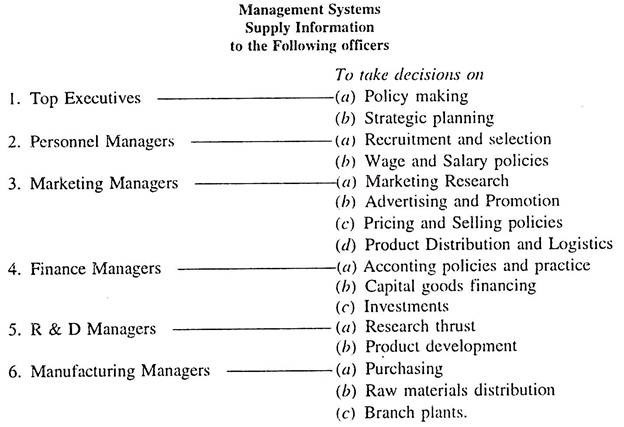After reading this article you will learn about the need for information in any organisation.
Information is very much needed to make right decisions. Management is faced with an accelerating rate of change and an ever more complex environment. A multitude of factors may need to be considered for a given decision.
Examples include; planning regulations, local and central government legislation, the attitudes of employers, customers, trades unions, consumer groups and so on, the financial consequences of the decision, environmental factors, technological and capacity considerations, marketing and advertising implications, resource and supply problems etc.
For each and every one of the above examples—and others—the manager needs relevant information which is information that increases his knowledge and reduces his uncertainty and thus is usable by the manager for the intended purpose.
ADVERTISEMENTS:
Without relevant information no manager can function effectively. A worthwhile extension to the well-known adage that management get things done through people, would be that, ‘management get things done through people, by using relevant information.
One of the most important processes in managing the activities of an organisation is making decisions about alternatives. When the information available is not sufficient to make a decision, the manager needs to gather more information about the alternatives, compare them, and then choose an alternative. Decisions made without sufficient information are at best only estimates and typically lead to poor management performance.
As shown in Fig. 39.3, quality information in the hands of those who can make good use of it supports appropriate management decision making. The resulting management performance should then lead to the successful achievement of the organisational objectives.
Thus, information is the common element that holds an organisation together.
ADVERTISEMENTS:
The relationship of the information systems of an organisation to the decision making within that organisation is given below:
The above clearly shows the need for information in any organisation.
ADVERTISEMENTS:
Every organisation is dependent upon information for its survival. In order for managers to take action that will yield effective results, they need information that is accurate, timely, complete, concise, and relevant. There is no assurance that the manager will use this type of information effectively; however, it must be available to be used. In most cases, the availability of information to a manager will have a strong influence on the rationale applied in decision making. Managers are often required to make decisions with information that lacks one or more of the properties above.
This can have an undesirable impact on the effectiveness and efficiency of their decisions:
(1) The accuracy of information is the ratio of correct information to total amount of information produced over a period of time. For example, if the monthly sales forecasts provided to a plant manager are not consistently accurate, it is difficult for the manager to make effective decisions concerning production schedules.
(2) Timeliness of information is a reflection of whether or not the information arrives in time to be used by a manager in making a decision. The plant manager must receive the monthly sales forecast in time to make a decision about the monthly production schedule.
ADVERTISEMENTS:
(3) Completeness of information requires that a manager be provided with all of the information needed to make a decision. If sales forecasts cover only two-week periods, it is difficult to make decisions about monthly production schedules.
(4) Conciseness of information is obtained through the summarization of relevant data. Such data may point out exceptions to normal or planned activities. A manager who receives concise information is saved a great deal of time otherwise spent in analysis of information for decision making.
(5) For information to be relevant, it must provide to each involved manager what he or she needs to know. Information should not be given to a manager who does not have the authority to make the decision(s) which should be based on the information.
(6) Information should be produced and provided at a frequency which is related to the type of decision/activity involved. The frequency may be an hour, a day, a week, a month etc.
ADVERTISEMENTS:
(7) Information should be presented in a style and format readily understandable by the person concerned. The producer of the information must be aware of the recipient’s knowledge, literacy level, experience etc.
A frequent problem in many organisations is that a great deal of information is generated for no real purpose and should be eliminated. Apparently there seems to be a tendency to generate large quantities of information on the assumption that a direct relationship exists between the amount of information and the quality of decisions. This can only be true if the information is relevant and provided to the right decision maker-that is, is provided to the right person at the right time.
One useful approach to the effective design and utilisation of an MIS is to think of information as a basic resource of the organisation as we do money, materials, personnel, and plant and equipment.
Thus as a basic resource, information:
ADVERTISEMENTS:
1. Is vital to the survival of the organization.
2. Can only be used at a cost.
3. Must be at the right place at the right time.
4. Must be used efficiently for an optimal return on its cost to the organisation. Each user of information should consider the cost of the information relative to its utility for decision making. For example, the cost of complete information for a decision must be weighed against the expected value of a decision with incomplete information.

